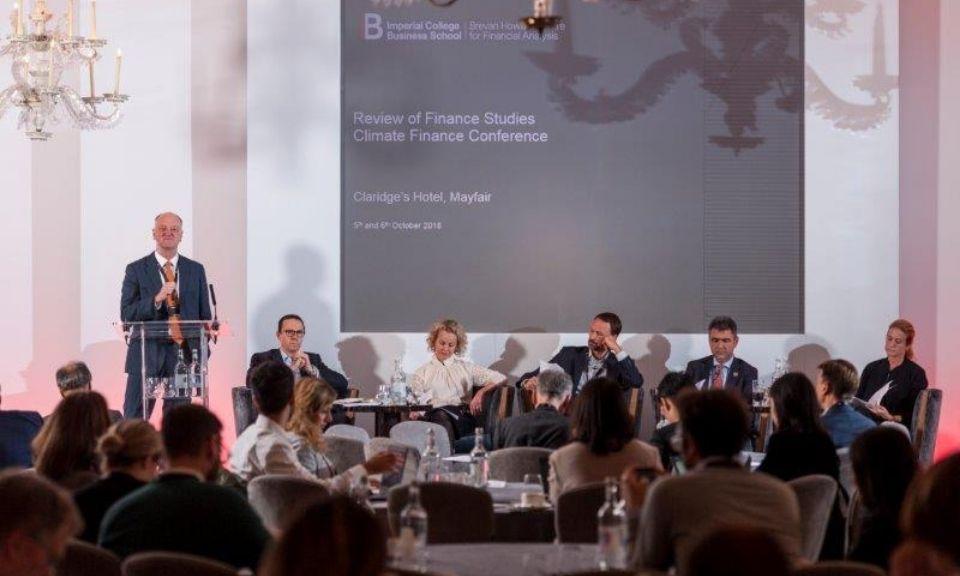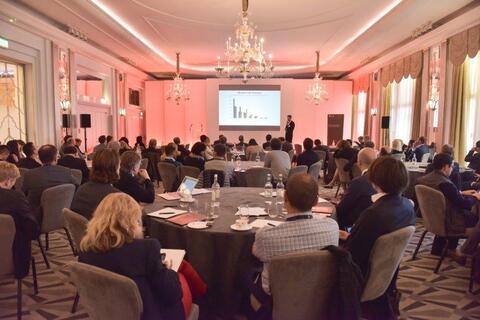
Published
“Why is climate change ignored by finance journals?”
It’s a question we have asked many times since founding the Centre for Climate Finance and Investment at Imperial Business School just over a year ago. Over the past two decades only 12 in over 20,000 articles published (0.06%) in the top 20 finance journals related in some way to climate change[1]. Not a single article relating to climate finance had been published in the top three financial journals. With colleagues at Columbia University and the Review of Financial Studies, we have set out to change that.
On October 5-6th, 2018, Imperial Business School hosted the second of a two-part Climate Finance Initiative, built around a call for climate finance research proposals by the Review of Financial Studies (RFS). With the support of Norges Bank Investment Management, the conferences were designed as a novel two-stage editorial process, intended to encourage researchers to engage in innovative research on this emerging topic. The first conference was held at Columbia University on 30th November, 2017. The RFS journal will publish a special volume on climate finance in Spring 2019, a key milestone in academic climate finance that will inevitably lead more of the world’s best finance researchers into the area.
The climate finance research gap
Public awareness of the implications of climate change continues to grow, causing scrutiny to fall on those who have the power to make decisions and change the course of action. CEOs, CFOs and CIOs (Chief Investment Officers) control a critical mass of capital, which if applied correctly, would enable substantial progress towards transitioning to a low-carbon economy. But which data and research should these decisions be made on? As the findings from academic finance research trickle down into mainstream thinking, they shape board-level investment decisions. Without this crucial body of research, uncertainty spreads, investment opportunities are missed, and progress on addressing climate change is hindered.
Addressing the research gap
Fortunately, the dearth of published climate finance-related research did not go unnoticed. In particular, growing demand from industry practitioners prompted a call-to-action. A pivotal point was reached when HRH The Prince of Wales, patron of the Cambridge Institution for Sustainability Leadership (CISL), challenged the academic finance community – including editors of top finance journals – to start publishing papers.
Andrew Karolyi, editor of the leading financial academic journal, The Review of Financial Studies (RFS) and Associate Dean at Cornell University responded to this call-to-action. But the first hurdle in publishing climate finance papers was receiving papers to publish. Unlike climate science research, climate finance is a nascent field and the papers simply didn’t exist.
106 proposals from the world’s leading academics were received, of which 11 were chosen to present their results at the RFS Climate Conference in London. The 11 papers presented at the RFS Climate Conference represent the first body of knowledge on the topic of climate finance, laying the groundwork for future research. The research reflected topical climate issues including; investigations into investor attitudes and climate change, pricing climate change uncertainty, the financial implications of sea-level-rise, financing climate change solutions and hedging climate risk. The papers prompted lively discussion and critique from some of the world’s leading scholars, uncovering future avenues of research in the field.
An industry panel of executives from some of the world’s largest financial institutions weighed in on the findings, providing an essential ‘so what?’ from users of the research. Providing their insights on the panel were Carine Smith Ihenacho, Chief Corporate Governance Officer, NBIM; Peter Knott, Managing Director, head of Green Investment Ratings, Green Investment Group; Ashley Schulten, Managing Director and Head of Climate Solutions, Fixed Income Group, Blackrock; Michael Wilkins, Managing Director, Sustainable Finance, Corporate and Infrastructure Ratings, S&P Global.
Francisco Veloso, Dean of Imperial Business School, delivered the closing remarks, which drew upon Imperial College’s collaborative multidisciplinary approach to tackling the world’s most pressing problems. Consensus from industry was that the new initiative was providing a rich source of information and research, hugely relevant from a practical standpoint.
Impacts of the research
Advancements in academic climate finance will aid practitioners in disclosing their material climate change risks, an issue that is gaining increasing attention from investors and policymakers as well as the Bank of England. The TCFD 2018 Status Report uncovered huge scope for improvement in corporate climate disclosure. But industry perspectives indicate that a lack of climate expertise within companies makes disclosure a challenge. Greater collaboration between academia, policymakers and industry will help disclosure make the crucial step from words to numbers.
For decades we have been aware that our current environmental problems are inextricable from economic and political endeavors. Financial research can no longer be kept in a silo. The publication of the special volume provides the first step in preparing the next generation of finance practitioners to respond to climate change-related issues. The content of leading finance journals often underpins the curriculum of taught undergraduate and postgraduate courses. As future generations will experience the impacts of a changing climate, it is crucial that we equip them with the knowledge required to adapt the modern financial system to these changes.
Maya Skinner
Centre for Climate Finance and Investment, Imperial Business School
[1] Diaz-Rainey, I., Robertson, B., & Wilson, C. (2017). Stranded research? Leading finance journals are silent on climate change. Climatic Change, 143(1–2), 243–260.


